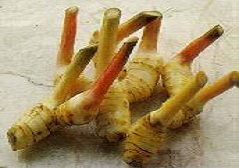
Alpinia galangal / الخولنجان
COMMON NAME
Galanga, Galangal Major, Galangal Grande
LOCAL NAME
Golongan, Kholongan
Background
- Galangal is a tender aromatic perennial herb of the Ginger family with thick fragrant tuberous rootstocks, resembling the scent of ginger.
- It is a tropical plant from South East Asia, India, China and now widely distributed in the tropical and subtropical regions of the world.
Part Used
Rhizomes
Traditional and Medicinal Uses
Galangal was known to the ancient Indians, and has been in the West since the Middle ages. Its stimulant and tonic properties are recognized by the Arabs who ginger up their horses with it, and by the Tartars, who take it in tea. In the East, it is taken powdered as a snuff, and is used in perfumery. It has been used as/for:
|
|
|
|
|
|
|
|
|
|
|
|
How Much Do We Know?
Galangal has a long history of use in food and as medicine in areas of Asia, especially China and India.
What Do We Know About Safety?
- Likely safe when used orally in amounts commonly found in foods. It is Generally Recognized as Safe (GRAS) status in the US.
- Possibly safe when used orally and appropriately in medicinal amounts. Alpinia extract 300 mg daily has been used with apparent safety for 12 weeks.
- There is insufficient reliable information available about its safety when used topically.
Using Galangal by
Mouth
Alpinia extract 100 mg three times daily for 12 weeks.
Special Precautions & Warnings
Pregnancy and Breast feeding
There is insufficient reliable information available bout the safety of Alpinia when used in medicinal amounts during pregnancy and lactation; avoid using.
Keep in Mind
- Do not hesitate to speak with your health care provider before starting to use any supplements.
- Discuss potential benefits and risks, especially if you are suffering from any health problems.
